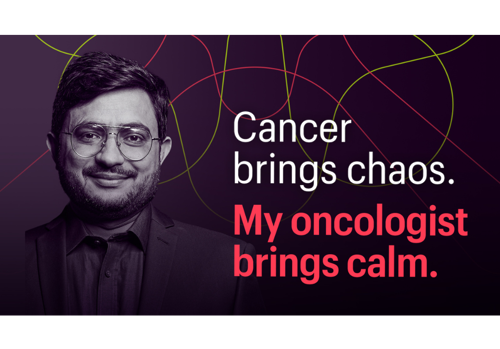Don't forget to register for a career in oncology
Are you interested in shaping your career in clinical oncology? The Clinical Oncology ST3 recruitment timeline and important dates are available.
Why choose clinical oncology?
Clinical oncology is an incredibly rewarding and stimulating career – and we support our Fellows and members throughout their careers, with expert guidance, networking opportunities and training, exams and education support.
We also held a webinar for those interested in applying for clinical oncology training, with senior consultants and current trainees sharing their experiences and providing a valuable insight into the daily life of a clinical oncologist.
Our speakers addressed several key questions during the webinar, and we’ve shared a selection below which were addressed by Dr Tom Roques, our Vice-President for Clinical Oncology.
Learn more
If you're interested in learning more about clinical oncology, you can sign up on our website, where you’ll also receive a link to view a recording of the webinar.
Q&A: Applying for clinical oncology training
Can you specialise in a site and then re-specialise if you find a new passion for another site?
Absolutely. I have always treated head and neck cancers, but my other tumour site has changed every six years or so for various reasons. That means I get to learn something new every now and then. Endless variation.
At what point would you decide your subspecialty? Would this be something you need to decide early on?
Not at all. You'll be trained in all subsites. You may find that one really excites you, but most of us choose where we want to be as consultants and then fit a job around that rather than committing to one subsite – and you can keep changing!
How does clinical oncology differ from medical oncology?
Medical oncologists use drug treatments such as chemotherapy, immunotherapy, etc. Clinical oncologists are trained to use drugs and radiotherapy, so there are more treatment options. In many centres, there is one oncology team that includes clinical oncologists and medical oncologists. (My colleagues are 'oncologists').
At what point do you decide between medical or clinical oncology? Is it the ST3 application?
Yes, but many people do apply to both. ST3 is the same, but you'd need to reapply for the other specialty if you want to change.
What does the future scope of radiotherapy look like? Are we expecting significant advances and changes in the way we deliver radiotherapy and its effects?
Radiotherapy continues to evolve. Better imaging techniques to help the oncologist decide what to target. AI to help us do that more accurately. Being able to target small metastases means we can now use very high doses of radiotherapy to ablate metastases and maybe even cure people who have metastatic disease. Radiotherapy still provides about 40% of all cancer cures (second only to surgery).
Would you please expand more on the future need of radiation oncologists? Is the field of clinical oncology in sustainable need of new radiation oncologists?
The advantage of the CO model is that you are trained to be pluripotent and able to treat patients with drugs, radiation, supportive care, or new treatments not even invented yet. Radiotherapy is actually not that expensive (drugs cost a lot more). Protons are more expensive which is why the UK is leading the world in trying to assess both the effectiveness and cost-effectiveness of protons.
The average cost of radiotherapy to cure cancer is a few thousand pounds per patient – including the treatment machine, staffing costs, etc. You will never be out of a job as a clinical oncologist.
Do people tend to stay in one hospital for all of their training or is moving around required?
You tend to be trained in two or three hospitals which is good for your experience. We try and make those rotations sensible and realistic for where you live. You'll usually know at the start where you'll be based so you can plan life.
What’s the role of immunotherapy or chemotherapy in clinical oncology (CO)?
Lots of immunotherapy and chemotherapy are still palliative – keeping people alive and with good quality of life for longer – rather than cure, but this is changing as the drugs improve. With palliative drugs, the skill is in balancing the potential benefits with side effects so people can live with their cancer, as many do. Where drugs are used for curing the emphasis is more on safely delivering the doses we know work from research trials.
As clinical oncologists, our role is to decide on the drugs and doses and lead the team (nurses, pharmacists, etc) to deliver the treatment.
Does LTFT training increase how long you are in training?
Yes – you'll have the equivalent of five years full-time. We're a very LTFT-friendly specialty though.
What does an holistic approach mean when it comes to clinical oncology?
It means keeping the patient at the centre of all that we do – helping them decide what treatment option is best for them, with their perspective on life and death. It means we have really interesting, deep conversations with people. If you are inquisitive about people, then it's a great specialty.
____________________
The RCR play a major role in the training of clinical oncologists, setting the standards and curriculum that lead to the award of a Certificate of Completion of Training (CCT) and entry on to the GMC's Specialist Register.
